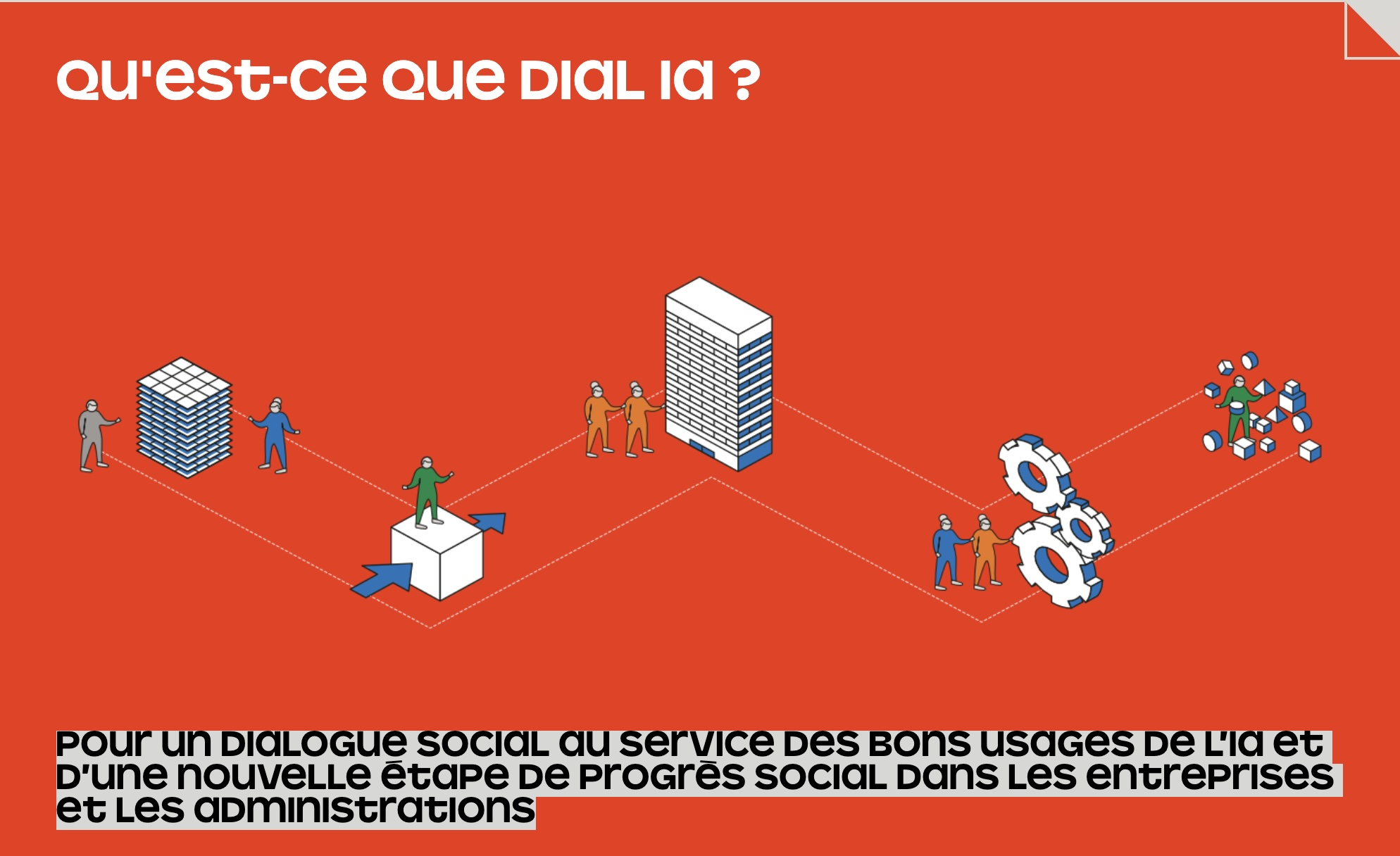« Artificial intelligence, like any other technology, cannot have economic rationalization as its sole purpose. AI must not be confined to strategies aimed solely at productivity or cost reduction. We must be able to guarantee that it can contribute to producing technological solutions that serve the general interest. »
For 18 months, some 50 participants from the worlds of labor and management, business and government, worked to develop Dial-IA, "an operational toolbox designed to foster technological social dialogue around AI".
This project, coordinated by the Institut de Recherches Économiques et Sociales (IRES) and co-financed by ANACT (Agence nationale pour l'amélioration des conditions de travail), involved four trade unions in particular: CFDT, CFE-CGC, FO Cadres and UGICT-CGT.
The project resulted in a joint manifesto and a series of fact sheets designed to help stakeholders become acculturated:
"Talking AI collectively within the company".
The toolbox also suggests "levers to activate in order to implement a technological social dialogue approach", aimed primarily at employee representatives.
She reviews the various reasons why employees and employers are talking and negotiating about artificial intelligence.
- AI is an issue of employer attractiveness: a strong majority of the more than 1,100 people surveyed by ODOXA for SAP agree that a company at the forefront of artificial intelligence appeals to young people (77%), is ahead of its competitors (72%), attracts talent (67%) and is more profitable (61%).
- The younger generations who are and will be entering the job market are already using AI, and increasingly so: young people aged 16 to 25 are already using AI on a massive scale. Nearly 8 out of 10 young people (79%) have used an AI tool during their studies or when choosing their career path. Of these, more than half (55%) say they use it at least once a month, and 25% every week.
- AI and the professional uses of executives, a milestone has been reached: According to a survey by the Association Pour l'Emploi des Cadres (APEC), 71% of executives believe that AI tools could be useful to them, and 53% say they want to start training in the use of these new tools. Companies have understood this: 1 in 4 executives is now encouraged by their company to use AI in their professional activity. The number of executives who have already tested AI at work has doubled in one year (41% vs. 19% in 2023), and 34% of executives see AI as an opportunity for their job.
- Investment cost is the main brake on the deployment of AI technologies: dialogue helps keep costs under control. According to a Pôle Emploi survey of 3,000 establishments with more than 10 employees, 45% of respondents (51% in Industry) felt that cost was the main brake on deploying this technology.
- AI technology at work can be scary, all the more reason to talk about it: 44% of employee respondents fear that their job will be replaced by an AI or robot (+9 points since 2017). According to Odoxa's findings, "French employees are aware that reducing the risks of AI on employment necessarily involves bringing decision-makers and workers up to speed in this area". Six out of ten thus consider it necessary for companies to "offer their employees training and advice, provided by specialists, on how to use artificial intelligence in their day-to-day work".
- AI touches on subjects that concern us all: "Protecting privacy, respecting the intellectual property of a work and its copy, questioning what is true and what is not, what is truly humanly created and what is not, defining the ethical lines in corporate and social usage".
"Only one out of every two AIS projects developed in-house comes to fruition".
The Dial-IA project participants identify the various reasons for these failures:
- a total lack of understanding of the structural characteristics of any AIS:
- the essential role of the human element in qualifying the data that feeds the algorithm at the heart of AIS operations
- a specific iterative deployment process that distinguishes AIS from traditional IS solutions,
- the employer easily gives in to the siren song of "digital solutionism" rather than questioning the organization of his company
- the IAT is too often imposed in a top-down, forced fashion
- the question of the real needs of the company's players is rarely asked upstream of the process
- insufficient/inappropriate support for employees during the deployment phase
- a lack of fair social dialogue on the subject: informing/consulting the CSE at the operational launch of the project does not in itself guarantee useful and constructive social dialogue on the subject.
- real mistrust on the part of stakeholders inside the company: from HR to professionals in professions impacted by AI
"This simple observation should convince the employer of the importance of organizing a collective debate on AI within the company, since the ultimate aim is to prevent the additional costs generated by the project's failure from replacing the hoped-for productivity gains. On the basis of this shared observation, it seems appropriate to focus these spaces for collective debate within the company on the crucial question of the key role of company professionals in the success of the AIS project: both in defining the target needs to which the AIS will have to respond in complementarity with the "professions", and in clarifying the central role of the human factor throughout the project's deployment".
On this occasion, fundamental questions will emerge:
- How will existing professions evolve?
- What new professions are emerging?
- HR support for employees undergoing career transition?
- Which activities to outsource and which not?
Références :





